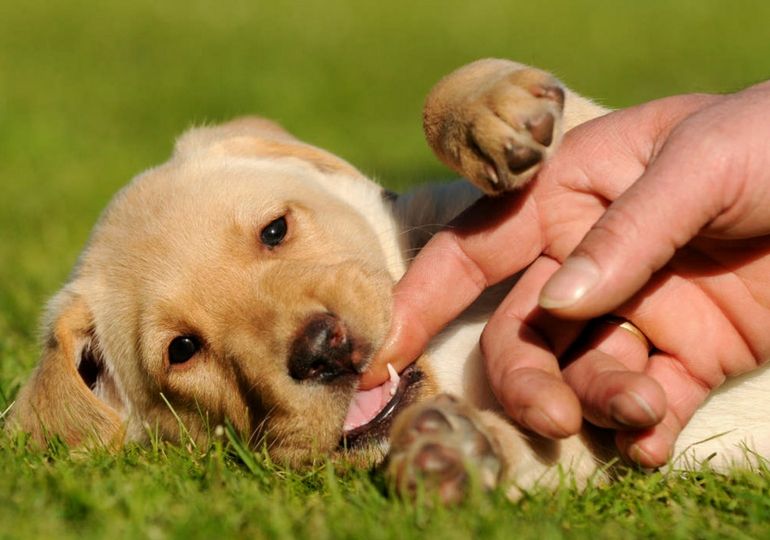When Does A Lab Puppy Stop Teething

We’ve compiled a puppy teething timeline so you know exactly what to expect as your furry friend grows into his adult body. Weeks 2 to 4: Your puppy will still be with his mother and breeder.
When does a lab puppy stop teething. Puppy teething gels. Understandably, some people want to use puppy teething gels. While putting something on a puppy’s gums may not make a lot of difference to the puppy, it feels good to be doing something to help. However, we recommend you have a chat with your vet before using puppy teething gels. A teething puppy may whine for no apparent reason. Puppies in pain may become apathetic and less interested in playing. There may be a disruption of the puppy's digestive tract--the puppy's appetite may wane and bowel movements may become loose and watery. You know how much damage a puppy can do to slippers with 28 baby teeth. Imagine how much damage 42 adult teeth will do to expensive work shoes! Throughout the teething process, it is important to provide acceptable objects for chewing on. Make sure to use toys specifically created to help with the teething process. Around 4 months of age, your Lab puppy will begin replacing the milk teeth with adult teeth. At 6 to 7 months, the full set of 42 permanent teeth will be in. As your puppy grows, the roots of his baby teeth are reabsorbed by his body. The adult teeth push up, loosening the baby teeth and eventually causing them to fall out.
Labradors were bred to be retrievers things with their mouths, and this means that the chewing phase can last a long time in Lab puppies. Vetsreet's Dr. Marty Becker offers tips for surviving the chewing years — including teaching your dog what he can and cannot chew on. When he does, immediately give a high-pitched yelp, as if you’re hurt, and let your hand go limp. This should startle your puppy and cause him to stop mouthing you, at least momentarily. (If yelping seems to have no effect, you can say “Too bad!” or “You blew it!” in a stern voice instead.) Praise your puppy for stopping or for. How To Stop Labrador Biting and Nipping. To stop your Labrador from biting, you must first recognize the reason behind this behavior. Stop Your Labrador Biting and Nipping When Teething. If your Labrador is teething then, this habit can be easily stopped with exercise and chewable toys. Ensure your puppy gets adequate exercise to burn his energy. Whenever your Lab puppy starts teething, you can expect that they will try to bite everything and everyone. That’s because chewing/biting is the only thing that helps with teething pain. So, how to stop a Lab puppy from biting during teething?
Puppy Teething Symptoms are evident, but for most of us, they may be misinterpreted as annoying behavioral problems. Unlike human babies who are teething, puppies are not likely to cry, run a temperature or get clingy. Rather, you might just notice that the puppy would rather bite you than love up to you. If your puppy is drooling, biting. Puppy teething is a nightmare, there's no two ways about it! That moment when you realize your dog finally has "big kid teeth" is second only to the moment they finally master potty training! Until that magical day arrives, we've got some fabulous tips on helping you survive the biting stage! Let's check them out! Yeah, your puppy’s teeth and gums hurt and (just like a human baby) chewing provides some relief. [Insert guilt for yelling at your puppy here] So, when do Lab puppies stop teething? Somewhere between 6 and 7 months, you can expect your dog’s teething to stop. You should not ignore your puppy’s chewing during the teething stages. Teething is a necessary part of growing up for every puppy, and most dogs tolerate the process pretty well, Dr. Coates says. As a pet parent, you can help during this transition by providing appropriate dog toys, introducing dental health habits and watching out for signs of trouble.
How to Survive Puppy Teething. When your puppy is about three to four months old, his baby teeth will start shedding, making room for about 42 adult teeth to come in. The puppy bites hard enough to cause pain, but does not break the skin; The puppy bites hard enough to break the skin. There could be additional levels of biting beyond five (the puppy tears the skin, the puppy repeatedly bites the skin, puncturing it, the puppy bites and shakes the hand, etc.). Puppies start teething at 3-4 months old. With some exceptions, puppy biting will stop by the time your puppy has his full set of grown up teeth at 7 months. Puppies go through various teething stages including early and temporary teeth (deciduous or "milk teeth"), sore gums, and eventually—the growth of 28 baby teeth. During teething, puppies may target all kinds of unexpected objects to gnaw and chew on, like baseboards and shoes, to relieve the discomfort.



















